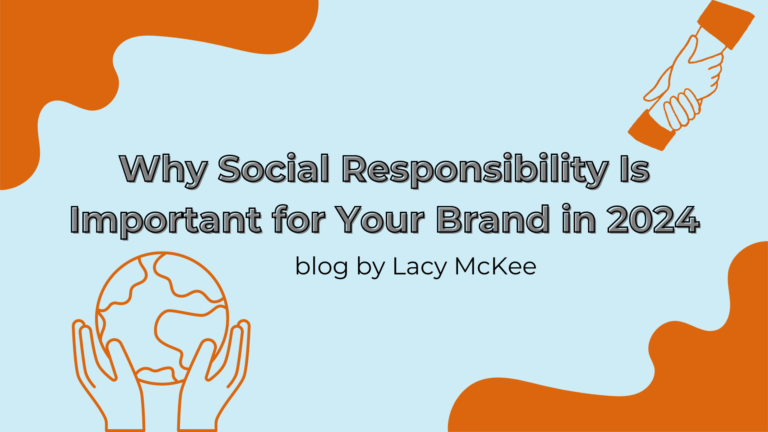Why Social Responsibility is Important for Your Brand in 2024
by Lacy McKee

Illustration by Caroline Routh
Brands are more than just brands in 2024. According to the 2019 Aflac CSR Survey, “55% of American consumers say it’s important for companies to take a stand on social and political issues” and 77% of them are “motivated to purchase from companies committed to making the world better.”
Social responsibility has become a key branding strategy for companies to build trust and buy-in among audiences. In fact, according to Zipdo, “76% of companies report on CSR as a way to reduce brand reputation risk.” From creative campaigns that advocate on behalf of social issues to employee volunteering programs, there are numerous opportunities for your brand to get involved in corporate social responsibility.
What is Corporate Social Responsibility?
Corporate social responsibility is defined as “a management concept whereby companies integrate social and environmental concerns in their business operations and interactions with their stakeholders,” according to the United Nations Industrial Development Organization. It is most commonly defined through the process called “triple bottom line,” which focuses on the organization’s progress in the areas of social, economic and environmental initiatives.
Another similar framework used to examine businesses’ social responsibility is environmental, social and governance (ESG). The ESG framework is also used to help brands evaluate risks and opportunities for their business for stakeholder investments.
Central to both of these frameworks is the idea of accountability, holding corporations and other businesses to their commitments in these areas. For example, companies’ pledge to be net-zero by 2040 or have a 50% increase in diverse leadership in the next five years.
Why is Social Responsibility Important for Brands?
As highlighted earlier, there are many benefits to a company showcasing its social responsibility. One main reason is that social responsibility builds brand trust among new and returning audiences. Highlighting key efforts by your brand to make responsible progress, such as highlighting recent sustainable accomplishments or company-wide volunteering events on social media, allows your business to differentiate itself from competitors and capture the attention of socially conscious consumers.
Another main reason to be socially responsible is to create a positive brand reputation. More and more consumers want to buy from organizations that are “ethical” and are becoming more concerned with businesses’ balance of profit and positive impact. By showcasing that your brand is using its funds to propel the public good, audiences will have a positive reputation of your brand and may be more likely to purchase from you compared to a competitor.
Additionally, social responsibility efforts can attract and retain talent. According to a study by Porter Novelli, 92% of employees at a company “with a strong sense of purpose say they would be more likely to recommend their employer to those in their network who are looking for a job.” This finding showcases that employees are both engaged themselves by feeling a sense of brand purpose, or social responsibility, and are helping drive brand growth through word-of-mouth goodwill among other potential employees.
How Can I Incorporate Social Responsibility into My Brand?
Here are some tips to get started in thinking about social responsibility and how you can strategically incorporate it into your brand messaging and strategy in 2024.
Make sure it makes brand sense
Make sure the initiatives you decide to focus on within this transition to social responsibility make sense for your specific brand. The Always #LikeAGirl campaign is an excellent example of a company using what they already knew about their product and services to enter into a social conversation that is authentic to their brand: female empowerment. This strategic choice allowed Always to build positive conversations surrounding their brand and actively impact a social issue at the same time.
Start small
As the famous quote goes, “Rome wasn’t built in a day.” Starting to incorporate the frameworks of social responsibility little by little will allow you to build a more robust, concrete strategy that takes into account your past successes and failures. This strategy allows you to figure out what works and what doesn’t and allows you to build genuine progress that can be sustained long-term.
Work together
Working with your team collaboratively, instead of a top-down approach, will help your brand figure out what the pain points are of arguably your most important stakeholders: your employees themselves. Encouraging feedback among employees will empower your brand to be more transparent in your goals and allow your employees to feel connected to the brand mission further, a key aspect of social responsibility.
Develop a strong messaging strategy
Make sure your social responsibility efforts have a strong messaging strategy so that new and continuing audiences can see the progress your organization is making.
In sum, being socially responsible helps your brand “walk the talk,” aka incorporate your brand’s values and mission into everyday practice and contribute positively to the world around us.
The 1893 Brand Studio offers a wide range of services that can help your brand maximize buzz around your socially responsible initiatives. From designing social media campaigns to executing large-scale market research, our dedicated team of marketers is here to empower your organization’s progress. Contact us to get started!

